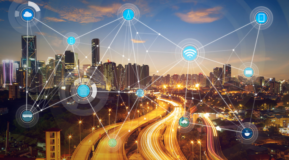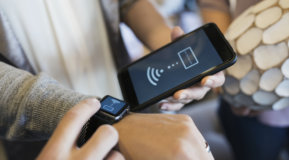![stevewood-blog-social-card_1116x595_a[2].jpg stevewood-blog-social-card_1116x595_a[2].jpg](https://media.arubanetworks.com/blogs/30000i2F0B601A6F36CB80.jpeg) A quick look around tells us that IoT is already making a significant difference to our lives. Connected smart meters wirelessly track our domestic energy usage while smart watches and smart cars play a small but influential role in the wider IoT movement. Let's also not forget connected home technologies, which include security sensors, connected lightbulbs, and smart toasters.
A quick look around tells us that IoT is already making a significant difference to our lives. Connected smart meters wirelessly track our domestic energy usage while smart watches and smart cars play a small but influential role in the wider IoT movement. Let's also not forget connected home technologies, which include security sensors, connected lightbulbs, and smart toasters.
With innovations like augmented reality (AR) goggles, voice-controlled assistants, and racing drones thrilling the senses, we are once again asking: When will the Internet of Things (IoT) really hit big?
Thanks to Aruba's recent study The Internet of Things: Today and Tomorrow, I'm glad to say we can finally put a date to it. We asked 3,100 executives from 20 countries about IoT, of which 1,150 respondents from Asia Pacific. The research found a diverse range of ideas and attitudes, but it also told us that 2019 would be IoT's breakthrough year. In fact, 86 percent of Asian organizations plan to start using IoT technologies by 2019—so put a note in your diary.
What are the other takeaways from the study? Here are the good, the bad, and the ugly:
- IoT is over-delivering - Yes, you heard that right. Our survey discovered an expectations dividend—where real-world benefits gained from IoT are exceeding original expectations in all areas. In other words, believe the hype! How many times can we say that about a new technology?
- Return on investments is looking very good - More than four-fifth of Asian companies utilizing IoT reported seeing an increase in business efficiency, while the average RoI from an IoT deployment is at 33 percent. This points toward how investments into IoT is not for naught.
- People claim to know what IoT means - But truth be told, only a handful really do. A massive 97 percent of those surveyed in Asia Pacific think they have the true definition, but there is no consensus. Keep reading, we will come back to this in just a moment.
- IoT has some hurdles to clear - While IoT has proven its value, barriers to unleash its true potential still exist. The cost of implementation (53%), the cost of maintenance (52%), and integration of legacy technologies (47%) are cited as top challenges facing Asian organizations. But there is hope: technologies are already available to cut both infrastructure costs and smoother integration process.
- IoT brings incredible opportunities but also credible threats - Alarmingly, 88 percent of organizations in Asia-Pacific have experienced an IoT-related security breach. As IoT continues to grow, we need to take steps to protect our network and devices. Without complete visibility into IoT, organizations are leaving themselves wide open to attacks.
How does Asia compare with the rest of the world?
Arguably, Europe, the Middle East, and Africa (EMEA) have a more conservative approach toward IoT today. The EMEA region shows a 50 percent uptake of IoT technology, compared with 60 percent in Asia Pacific and 66 percent in the Americas. This could stem from a lack of preparedness and willingness to explore IoT's benefits. Currently, 17 percent of EMEA respondents claim their IT infrastructure is not ready for IoT yet—nearly double that of the Americas. Still, 82 percent of EMEA organizations plan to adopt IoT technologies by 2019. There is still a little way to go for them to tap the full potential of IoT.
IoT has already made its mark
This year's Mobile World Congress and IoT Asia are the perfect platforms to see IoT's successes come to life. This includes Ford's ten-million-selling in-car SYNC system, featuring an automated emergency services link in the event of a crash, and the flood of healthcare applications such as Boston Children's Hospital's revolutionary use of smartphones to help detect and fight respiratory disease.
This means business
Talking about IoT's achievements brings us neatly to what IoT means. You'll remember from our survey that a single, coherent definition of IoT has so far eluded companies across the world, so who better to give the final word than Kevin Ashton. A renowned tech pioneer, Ashton coined the phrase 'Internet of Things' back in 1999. Little did he know how his new phrase would be used—widely!
In his new eBook 'Making Sense of IoT', commissioned by Aruba, Ashton offers this as a definition:
"What is the Internet of Things? It is not connecting everyday objects like toasters and refrigerators to the Internet. Products like these exist, but it is hard to see why What defines the Internet of Things is data capture the 'Internet of Things' means sensors connected to the Internet and behaving in an Internet-like way by making open, ad-hoc connections, sharing data freely and allowing unexpected applications."
In short, IoT is now serious stuff. Just don't call your 32 functions, self-cleaning toaster smart.




